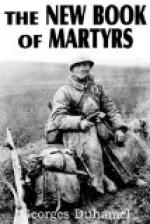The chair is rather far off, the cards are dirty, and sometimes Houdebine asks his silent adversary: “What’s that?”
Panchat takes the card and holds it out at arm’s length.
Houdebine laughs gaily.
He plays his cards one after the other, and dummy’s hand also:
“Trump! Trump! Trump! And ace of hearts!”
Even those who cannot see anything laugh too.
Panchat is vexed, but he too laughs noiselessly. Then he takes out the lost sou from under his straw pillow.
Meanwhile, Mulet is telling a story. It is always the same story, but it is always interesting.
An almost imperceptible voice, perhaps Legras’, hums slowly:
Si tu veux fair’ mon bonheur.
Who talks of happiness here?
I recognise the accents of obstinate, generous life. I recognise thine accents, artless flesh! Only thou couldst dare to speak of happiness between the pain of the morning and that of the evening, between the man who is groaning on the right, and the man who is dying on the left.
Truly, in the utmost depths of Hell, the damned must mistake their need of joy for joy itself.
I know quite well that there is hope here.
So that in hell too there must be hope.
IX
But lately, Death was the cruel stranger, the stealthy-footed visitor.... Now, it is the romping dog of the house.
Do you remember the days when the human body seemed made for joy, when each of its organs represented a function and a delight? Now, each part of the body evokes the evil that threatens it, and the special suffering it engenders.
Apart from this, it is well adapted for its part in the laborious drama: the foot to carry a man to the attack; the arm to work the cannon; the eye to watch the adversary or adjust the weapon.
But lately, Death was no part of life. We talked of it covertly. Its image was at once painful and indecent, calculated to upset the plans and projects of existence. It worked as far as possible in obscurity, silence and retirement. We disguised it with symbols; we announced it in laborious paraphrases, marked by a kind of shame.
To-day Death is closely bound up with the things of life. And this is true, not so much because its daily operations are on a vast scale, because it chooses the youngest and the healthiest among us, because it has become a kind of sacred institution, but more especially because it has become a thing so ordinary that it no longer causes us to suspend our usual activities, as it used to do: we eat and drink beside the dead, we sleep amidst the dying, we laugh and sing in the company of corpses.
And how, indeed, can it be otherwise? You know quite well that man cannot live without eating, drinking, and sleeping, nor without laughing and singing.
Ask all those who are suffering their hard Calvary here. They are gentle and courageous, they sympathise with the pain of others; but they must eat when the soup comes round, sleep, if they can, during the long night; and try to laugh again when the ward is quiet, and the corpse of the morning has been carried out.




